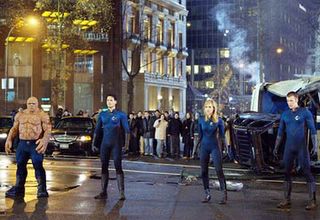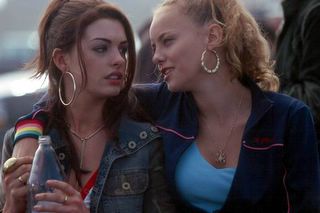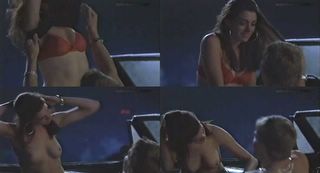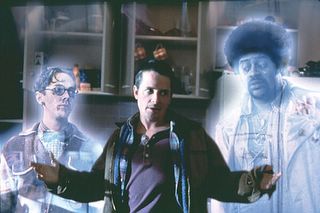He thinks you're stupid.
I swear. He told me.
Well, he didn't tell me. I've never met Ron Howard. But his movies indicate his views about the common American clearly enough. For him, the average American filmmaker is a dim sort. He or she goes to see a movie, but needs to be constantly reminded of what the movie is actually about. He or she knows nothing about American history, and so, when making a period piece, you must include helpful subtitles, newspaper headlines and context-based dialogue to give him or her proper bearings. And, of course, the average filmgoer is incapable of understanding nuance or shading of any kind. Stories must always be based on dualities - rich vs. poor, good vs. corrupt, family man vs. bachelor, insane vs. sane. Anything else is too complex for a simpleton to follow, and thus invalid in terms of proper storytelling.
In A Beautiful Mind, his most offensive film to date, Howard attempted to portray mental illness as a simple duality - a man can choose to be sane and, with the help of a good woman and his own strength of resolve, can defeat even a theoretically "incurable" condition like schizophrenia. Though Apollo 13 is probably his best film, it's still a complicated story that's simplified and turned bombastic, a true-life miracle of scientific ingenuity rendered as yet another gooey melodrama about American heroes who never say die.
And now, with Cinderella Man, Howard sets his mediocre abilities on the Great Depression, churning out a predictable slice of pap in which Russell Crowe defeats the horrors of cyclical poverty through a force of sheer will.
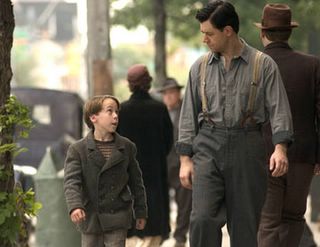
How does he get away with it? How can someone whose films have never once been provocative, memorable, intriguing or thoughtful be constantly listed among America's best and most beloved directors. When the guy makes a film, it's immediately considered an Oscar contender, despite the fact that all of his films are stupid and boring and obvious in exactly the same way.
Nothing happens in Cinderella Man, nothing, that is not obviously foreshadowed 10 minutes ahead of time. How does Howard imagine he will maintain our interest if we are never once surprised?
Jim Braddock (Russell Crowe) was a boxer, a contender in the late 20's who never quite made it to the upper echelon of the professional circuit. By 1933 ("4 years into The Great Depression," as we are informed by a handy-dandy title card) he's all washed up, begging for work at the docks along with all the other schlubs. (A strewn old newspaper helpfully informs us that "Unemployment Reaches Record Highs!" in case we missed that week in history class).
Things look pretty bleak for good ol' Jimmy, a man so forthright and honest that he forces his son to return a stolen salami even when the family's starving, who goes on public assistance but repays the money to a government office the moment he earns enough. But then, his fiesty manager (Paul Giamatti, the best part of the movie by far) gets him a one-time-only shot at a fight with a heavyweight contender.
And, of course, Jimmy wins, and becomes an inspiration to downtrodden unemployed folks everywhere, and eventually gets a title shot and blah blah blah blah blah.
I mean, Ron can't really help it if the story he's telling is kind of a generic feel-good sports story. It's a true story! He and Akiva Goldsman (the screenwriter, who also wrote A Beautiful Mind and, as long as I'm listing credits, Batman and Robin) can't alter the facts to make the story more original.
But what they could have done is given it nuance, detail and life. They could have tried to make Braddock an interesting character, but instead they've made him a typical Russell Crowe hard-ass martyr. He's proud, loves his family, and is incapable of doing any wrong, at all, at any time. But he's also friendly, kind, an excellent neighbor, capable of mustering up the power to complete any physical task, no matter how impossible-seeming, generous to a fault and he never ever ever ever breaks a promise.
They likewise could have given Mae a personality aside from fierce loyalty and pride in her husband. I mean, their scenes together are ceaselessly dreary because they are not people. They are placeholders. Loving Wife. Loving Husband. Cherubic Impoverished Children With Conveniently Non-Fatal Headcolds. There are family scenes there that remind me of the local theatrical productions of "A Christmas Carol" in which I performed as a young child in Philadelphia. Some amatuerish actress stroking the hair of some blonde moppet..."There there, my child...Father will be home with the coal soon...And this Christmas, there shall be a fat goose for our feast, the fattest goosein all of Londontown!"
And though the sets are large and impressive in their detail, the costumes period accurate and the cinematography appropriately honeyed and gauzy and bright, the world of Depression-Era Jersey and New York never really comes alive. Because it's a romanticized notion of poverty, and of the Depression. It's Ron Howard's Magical Poverty Simulator, capable of giving you a visual sense of being impoverished but without a clue as to evoking the true, gritty reality of being cold, hungry and hopeless.
Everything looks authentic, but that just makes you more keenly aware of how Ron Howard wants to manipulate you. There are scenes of children huddling together in corners for warmth, but rather than feel empathy for their plight, you keep waiting for them to leap out of their seats singing "Food Glorious Food." It's so blatantly theatrical, so fetishized, and so so very unreal.
I don't know if it's just that Renee Zellweger isn't much of an actress, so I can never see her as anything but a squinty celebrity trying desperately to make me think she's an Irish immigrant. It could also be Thomas Newman's flat score, or Goldsman's pedestrian dialogue, or just the fact that the movie's so unbelievably repetitive and drab, but I found myself incapable of suspending disbelief in the world of the film for one moment.
Could part of the problem be that Howard has been a celebrity since childhood, and is probably very removed from having to worry about money (if he's ever had to worry about money at all...I sincerely don't know...) I'm not saying that no wealthy person can make a movie about a poor person. Obviously, such a thing is commonplace, and has been done quite well. I'm just trying to come up with some reason for Howard's inability to communicate the unfortunate conditions in which the Braddocks live.
That being said, the boxing scenes fare much better. Howard wisely rips off much of Scorsese's technique from Raging Bull. He distorts the geometry of the ring, making it at times unthinkably massive or tightly claustrophobic. He uses a lot of quick cuts and jump cuts, and even inserts shots of flash bulbs going off (a direct lift from the Scorsese film). He even borrows the Bull technique of squirting water all over the actors, to give an exaggerated sense of sweaty, weary fatigue. For the most part, it works.
(Occasionally, he gets a bit carried away. During one flurry of edits, Ron jumps quickly to an X-ray shot showing one of Braddock's ribs cracking. It's like he switched from Classy Mainstream Period Piece to Guy Ritche Film for just a moment without switching back. I'm hesitant to criticize him for it, because at least he's trying to do something vaguely interesting, even if David O. Russell did it in 1999 for Three Kings and Ritchie did some pretty similar stuff in Snatch a few years later).
The entire film builds to an extended boxing sequence in which Braddock fights world champion Max Baer (Craig Bierko, an effectively looming presence). I read at the time of the film's release that some Jewish rights groups were upset at the depiction of Max Baer as such a cowardly, mean-spirited villain, but I don't think it's anti-Semetic. It's just retarded.
I mean, could the real Max Baer have been such an unbelievable asshole? It seems unlikely to me. He's a real monster in this film, which, as I said, is unsurprising considering Howard's innate fear of nuance. Of course he has to be a being of pure evil, to offset Braddock's being of pure good. It all builds to the most shamelessly maudlin, obvious, manipulative sequence of the year, in which the entire city of New York stands behind Jim Braddock as he beats the snot out of that uppity hook-nosed Baer bastard. Howard piles it on thick, even by his standards. I'm left unimpressed.
I don't know...Maybe Ron's right and Americans really are this stupid. Maybe they can't appreciate a movie whose themes aren't spoken aloud by random characters every ten minutes.
And that happens in this movie. In one scene, Mae goes to a church to pray for Jim, and finds that the entire neighborhood is already there, praying. The priest walks over and she says, "I'm here to pray for Jim." Then he says, "So are all of them. I guess they feel like...he's fighting for them, too."
OH GOOD LORD, RON! YOU'VE BEEN MAKING MOVIES SINCE THE EARLY 80'S! GROW THE HELL UP!

